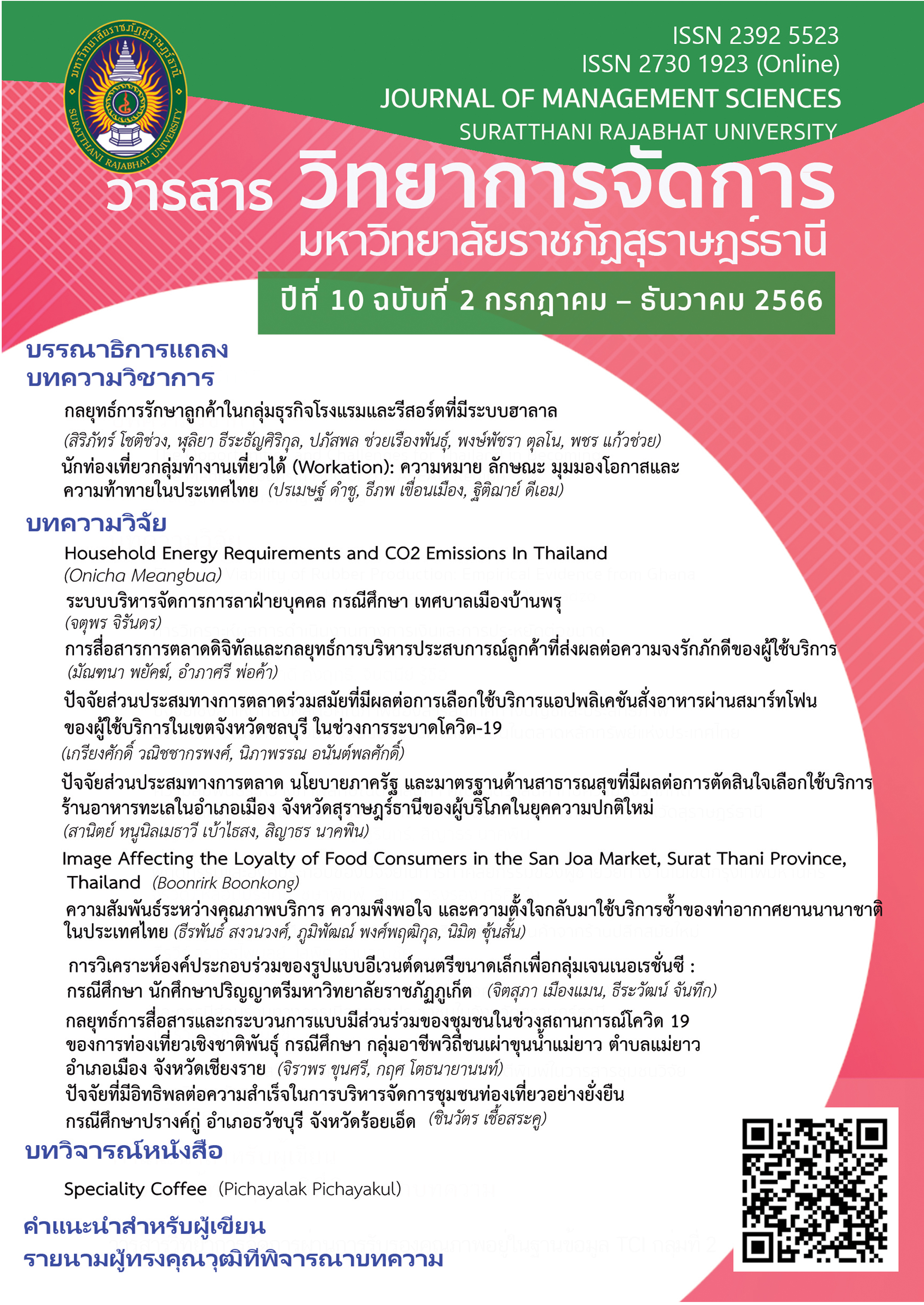The Strategy Of Customer Retentions Of Hospitality Which Has Halal Targets
Main Article Content
Abstract
Customer retention strategies are essential to all businesses, especially hotels and resorts. Therefore, this academic article was aimed to create intensive impressions for tourists who use services of hotels and resorts with the availability of a Halal system in the modern living and that the impressive feeling is strong enough to repeat their travel, without the thought of using the competitors' business. The result of global Muslim tourism index 2018 shows that, for Muslim tourists, the popularity of Thailand ranks second among non-Muslim countries. In order to maintain their customers, hotels and resources need to have attractive strategies which can be comprised of: 1) creating the features of customer relations towards the business; 2) building positive customer experience; and 3) constructing quality of service. The purpose of these strategies is not only a constant long term benefit for the hospitality business but also a cost reduction in the operation as well as the marketing. Maintaining the customers by offering Halal system in hotels and resorts makes the system become one of the highlights in the country tourism industry that, subsequently, the government has added to its policy to make Thailand the center of Halal service, not only in the Asian region but also the globe. Thus, the task of customer retention is important for hotels and resources with an availability of Halal system to sustainably grow.
Article Details

This work is licensed under a Creative Commons Attribution-NonCommercial-NoDerivatives 4.0 International License.
References
Aryuwatthanachai, K. (2018). Halal Trip, Golden Opportunity for Tourism Business. https://www.posttoday.com/life/healthy/551948
Benyarit, P., & Saiyasophon, S. (2018). The Management of Thai Halal Hotel, case study: Hotels in Pattani Province. Thai Tourism and Service Journal, 13(2), 66-77.
Boshoff, C., & Staude, G. (2003). Satisfaction with service recovery: its measurement and its outcomes. S. Afr. J. Business Management, 34(3), 9-16.
Boshoff, C.A., & Klemz, R.B. (2005). The importance of doing it right the second time: two experimental studies of service recovery. Paper presented at Southern Africa Institute for Management Scientists Conference on 26 – 28 Sept. Bloemfontein.
Chantaradee, W., & Wingwon, B. (2016). Customer relation and Satisfaction Management Affecting Customer Loyalty of Government Saving Bank Region 9. Chiang Rai Rajabhat University Management Science Journal, 11(2), 71-86.
Cohen, E. (1979). Rethinking the Sociology of Tourism. Annals of Tourism Research, 6(1), 18-35.
Crescentrating. (2012). Rating System to rate hotel for halal friendliness. http://www.Rescentrating.com/muslim-guides/
Eccles, G., & Durand, P. (1998). Complaining customers, service recovery and continuous improvement. Managing Service Quality, 8(1), 68-71.
Frank, J. (1993). Planned Press and Public Relations (3rd ed.). Great Britain: Alden Press.
Jittijarunglap, K. (2019). Electronic Mount of Mount Communication towards Online Purchasing Behaviour. Business Information Technology Journal, 5(2), 43-65.
Jurattanasan, A., & Jaroenwisan, K. (2014). The Attribution of Shariag Compliant Hotel in Muslim Countries. Review of Integrative Business and Economics Research, 3, 39-44.
Kotler, P. (2000). Marketing management (The millennium ed.). Prentice Hall International.
Lake, L. (2010). Word-of-mouth marketing vs. viral marketing: What’s the difference?. https://www.thebalancesmb.com/word-of-mouth-vs-viral-marketing-what-s-the-difference-2295731
Lekbanjong, T., & Boonmee, J. (2016). The Development Approaches to Creating Service Standards of Halal Hotel for Supporting Muslim Tourists. Report from the 5th National Academic Conference 2016, Tourism for All for Tourism, Nakhonpathom, Thailand.
Little, E., & Marandi, E. (2003). Relationship marketing management. Thomson.
Lohtongkam, T. (2018). Techniques of Customer Retention for Sustainable. https://marketeeronline.co/archives/7327
MacCannell, D. (1973). Staged Authenticity: Arrangements of Social Space in Tourist Settings. The American Journal of Sociology, 79(3), 589-603.
Magnini, V. P., & Ford, J. B. (2004). Service failure recovery in China. Inter. J. Contemp. Hospitality Manag, 16(5), 279-286.
Nuritthamon, W., & Tipsri, N. (2020). Influences of Service Quality and Relationship management affecting Customer: Intention in Repurchase Service, Empirical Study on Customers Using Hotel Services in Ayutthaya. Northeastern University Research and Academic Journal, 11(3), 11-23.
Parasuraman, A. P., Zeithaml, A. P., & Berry, L. L, (1985). A Conceptual Model of Service Quality and Its Implications for Future Research. Journal of Marketing, 49, 41-50.
Reichheld, F. F., & Sasser, W. E. (1990). Zero defections. Quality comes to services. Harvard Business Review, 68(5), 105-111.
Robinson, C., & Barlow, W. (1959). Image Public Relations. Public Relations Journal, 15, 10-13.
Roongsitong, R. (2019). Winning in Emerging Markets. Srinakarinwirot Business Administration Journal, 6(1), 146-154.
Rosenberg, P., & Choufany, H. M. (2009). Spiritual lodging–The Sharia-compliant hotel concept. HVS Global Hospitality Services–Dubai.
Samankettarakorn, P. (2017). Customer Relation and Customer Retention in the Service Industry. APHEIT Journal, 23(2), 80-88.
Samori, Z., & Sabtu, N. (2014). Developing halal standard for Malaysian hotel industry: An exploratory study. Procedia-Social and Behavioral Sciences, 121, 144-157.
Sangkaduang, T., & Roongchuang, J. (2017). Recognizing Muslim Tourists’ Service Level towards Hal Tourism Management in Krabi and Phuket Provinces. Social Science and Humanities Academic Journal, 13(1), 135-168.
Sanyen, T., Sirijaru-anan, T., Hasoh, A., & Katangchon, S. (2018). Marketing Tendency, Service Industry and Friendly Tourism with Muslim Approaches. Pacific Management Institute Academic Journal, 4(1), 286-297.
Schoefer, K. (2008). The role of cognition and affect in the formation of customer satisfaction judgements concerning service recovery encounters, J.Consum. Behaviour, 7, 210-221.
Sriwisatiyakul, K. (2009). Customer Retention with Organization. http://crmbcs426.blogspot.com/2009/11/customer-retention-management.html
Thiyarattanachai, P., Satong-aye, S., & Kamonnetr, T. (2020). Managing Customer Complaint through Effective Communication. Rachapark Journal, 14(34), 322-336.
Wattanawarangkul, K. (2017). Opening Halal Hotels, Supporting of Muslim Tourism Hub. https://www.bangkokbiznews.com.
Witsanumahimachai, S. (2017). The Best Salesperson Strategies Handbook, Proactive Selling Techniques, stimulation of sales target with your own hand. Kanyawee.


